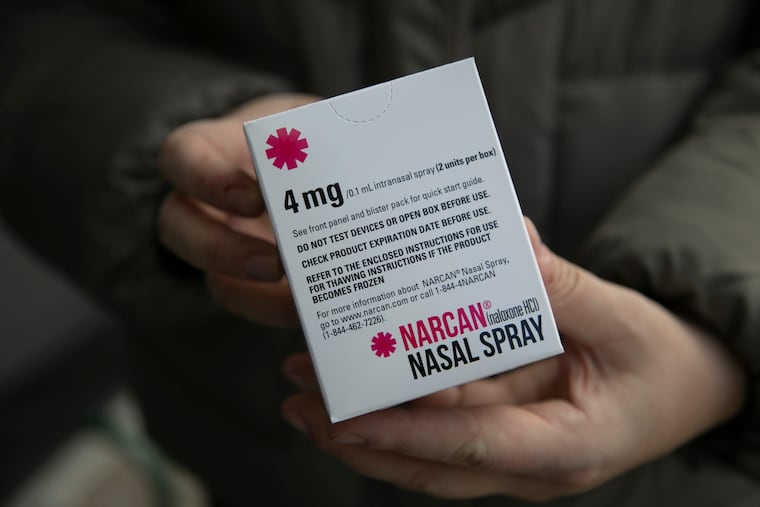It’s time for Pa. to stop allowing overdose deaths to be treated like homicides | Opinion
Allowing prosecutors to utilize a criminal charge called "drug delivery resulting in death" was intended to deter fatal overdoses. It hasn't.

When Samantha Criswell and her boyfriend, Tracy Beck, visited a home in Lower Windsor Township in August 2019 and injected “speedballs” — a lethal combination of two drugs, fentanyl and methamphetamine — it set off a cascade of tragedies.
Beck unintentionally overdosed. Criswell administered naloxone and CPR to revive him while calling 911 for emergency assistance. Despite her efforts, Beck died. Criswell was arrested and charged with drug delivery resulting in death, possession with intent to deliver drugs, and involuntary manslaughter. Because her 1-year-old son was present in the home when the illegal drugs were consumed, Criswell also was charged with endangering the welfare of a child.
Facing the prospect of decades in prison if found guilty of drug delivery resulting in death, Criswell decided to plead guilty to involuntary manslaughter and child endangerment. The prosecutors dropped the drug delivery resulting in death and possession with intent to deliver charges.
» READ MORE: U.S. appeals court overturns conviction for Montco woman serving a 21-year sentence for friend’s overdose death
On Dec. 6, Criswell was sentenced to 11½ to 23 months of incarceration, followed by two years of probation, and $1,157 in court costs. Beck’s mother, Brandy Lehr, spoke on Criswell’s behalf and asked for leniency, entreating that Criswell needs mental health and drug treatment, not jail time. The sentencing order included inpatient treatment for psychiatric and substance use disorders upon completion of the jail term.
Pennsylvania leads the nation in the number of cases involving drug delivery resulting in death charges. Pennsylvania’s drug delivery resulting in death criminal statute, which carries a maximum penalty of 40 years’ imprisonment, was intended to hold drug suppliers responsible for their actions, deter others from distributing drugs, and reduce drug overdose fatalities.
Yet, overdose fatalities have sharply increased over the past decade in Pennsylvania despite — and perhaps partly because of — the statute. Instead of targeting people at the upstream end of the supply chain, the charge has frequently been used against subsistence end-users and sharers who are struggling with addiction. Often, sharers are the friends or intimate partners of the deceased.
» READ MORE: Treating overdose deaths like murder will only deter 911 calls for help | Editorial
Rather than a deterrent, Pennsylvania’s drug delivery resulting in death statute undermines efforts to prevent drug overdoses. Help-seeking (or ”Good Samaritan”) behavior by co-users is discouraged for fear of arrest and a long prison sentence. Some users may choose to consume drugs alone, foregoing the possibility of help in the event of an overdose, to avoid ensnaring loved ones in a web of criminal charges in the event of accidental death.
Because the penalties for drug delivery resulting in death charges are so harsh, prosecutors can leverage the charge to induce a defendant to accept a bad deal, as we saw happen with Criswell. The damaging effects of a conviction extend beyond incarceration. A criminal record limits access to employment, housing, and higher education. The trauma of incarceration can continue for years after release. Parents who are imprisoned may lose custody of their children. Many of these children enter the child welfare system. Drug delivery resulting in death charges reinforce the cycle of poverty.
Drug overdose deaths claimed 100,000 lives nationally in 2020. This is a devastating public health crisis driven by a treatable disorder, not by moral weakness or character flaws. Yet, drug addiction continues to be criminalized.
Drug delivery resulting in death is a vestige of the “War on Drugs,” is catastrophically misapplied, doesn’t stop people from using drugs, and increases the risk of fatal overdose. We urge Pennsylvania lawmakers to amend the drug delivery resulting in death statute. It should not be wielded like a cudgel against whoever is last holding the drugs.
Rebecca Arden Harris is a family medicine physician and an assistant professor of family medicine and community health at Penn Med — the Perelman School of Medicine at the University of Pennsylvania. Shoshana Aronowitz is a doctorally trained nurse, family nurse practitioner, and an assistant professor in the department of family and community health at Penn’s School of Nursing. Rachel French is a fellow in the National Clinician Scholars Program and a postdoctoral fellow in the department of psychiatry’s Center for Mental Health at Penn Med. David S. Mandell is the director of the Center for Mental Health and the Kenneth E. Appel Professor of Psychiatry at Penn Med.